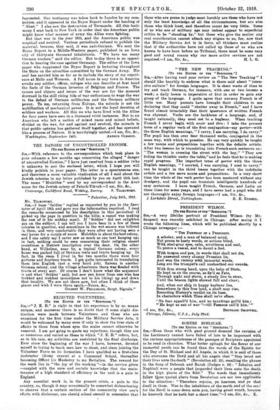"THE NEW TEACHING."
[TO THE EDITOR OT THE " SPECTATOR.")
Sue—After having read your review on "The New Teaching" I should like heartily to endorse what is there said about "inten- sive culture" for foreign languages. It is sheer waste of time to try and teach German, for instance, with one or two lessons a week; a daily lesson is imperative at first in order to gain any grasp of the language. I quite agree that nursery French is of little use. Many parents have brought their children to me declaring that they could "chatter away in French," and I have found almost invariably that their ignorance of written French was abysmal. Verbs are the backbone of a language, and, if taught rationally, they need not be a bugbear. When teaching French I never begin with avoir and etre : I take the present tense of a regular verb of the first conjugation—say porter—with the three English meanings, "I carry, I am carrying, I do carry." The pupil has then over four thousand verbs, conjugated in the same way, with which to practise. He can very quickly be taught a few nouns and prepositions together with the definite article. After two lessons he is translating into French such sentences as : "The woman is crossing the street with the boy," "They are hiding the thimble under the table," and he feels that he is making rapid progress. The imperfect tense of porter with the three English meanings, "I carried, I was carrying, I used to carry," can be taught in the third lesson together with the indefinite article and a few more nouns and prepositions. In a very short time the whole of the verb porter has been mastered without any drudgery, and the pupil can translate intelligently hundreds of easy sentences. I have taught French, German, and Latin on these lines for some years, and I have never had a pupil who did not thoroughly enjoy foreign languages.—I am, Sir, &c.,


































 Previous page
Previous page